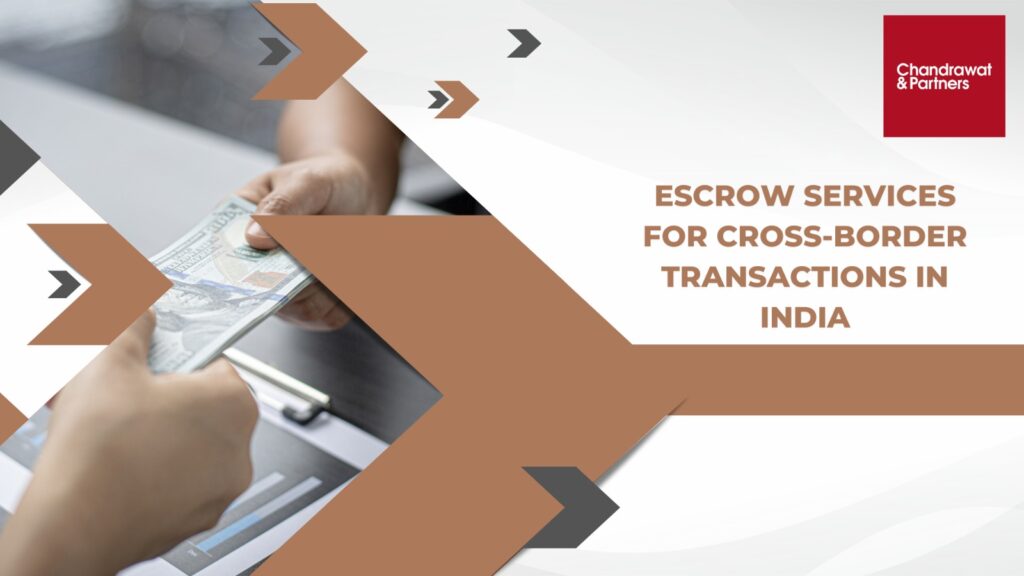Escrow Services for Cross-Border Transactions in India
Cross-border transactions are becoming increasingly common in India. With these transactions, however, comes a host of risks and challenges, particularly when it comes to payments. To mitigate these risks and ensure that both parties in a transaction are protected, escrow services have become an important tool.
An escrow service is a third-party intermediary that holds funds or assets on behalf of two parties in a transaction. The funds or assets are released only when certain conditions are met, which helps to ensure that both parties fulfil their obligations in the transaction.
In cross-border transactions, escrow services are particularly important because they can help overcome some of the challenges associated with international payments. For example, in India, there are strict regulations around foreign currency transactions, and it can be difficult to transfer funds across borders. Additionally, there may be concerns about fraud or disputes between the parties in the transaction.
Cross-border escrow services are useful for a variety of reasons, including:
- Risk mitigation: Cross-border transactions can involve significant risks, such as fraud, non-delivery of goods, and non-payment. Escrow services help mitigate these risks by providing a secure and neutral third-party intermediary to hold funds or assets until both parties have fulfilled their obligations.
- Compliance with regulations: Cross-border transactions can be subject to a variety of legal and regulatory requirements, including those related to foreign currency exchange, money laundering, and tax implications. Escrow services can help ensure compliance with these regulations, which can be complex and varied across different countries.
- Currency exchange management: Escrow services can help manage the complexities of currency exchange rates in cross-border transactions. By holding funds in a secure account until the transaction is complete, escrow services can help parties avoid the risk of fluctuating exchange rates and ensure that funds are transferred at the appropriate time.
- Facilitation of cross-border transactions: Cross-border transactions can be challenging to complete without the assistance of an escrow service provider. By providing a neutral third-party intermediary, escrow services can help facilitate cross-border transactions and provide confidence to both parties in the transaction.
- Dispute resolution: In the event of a dispute between parties, escrow services can help resolve the issue through mediation or arbitration. This can be particularly useful in cross-border transactions where parties may have different legal systems or cultural differences that complicate the dispute resolution process.
Challenges in cross-border escrow services
While escrow services can be highly effective for mitigating risks in cross-border transactions, several challenges are also involved in providing these services. Some of the main challenges include:
- Legal and regulatory compliance: Cross-border transactions are subject to a variety of laws and regulations, including those related to foreign currency exchange, money laundering, and tax implications. Escrow service providers must ensure that they are compliant with these regulations in both the sending and receiving countries.
- Currency exchange rates: When transactions involve different currencies, exchange rate fluctuations can have a significant impact on the value of the funds held in escrow. This can create challenges for escrow service providers, who must navigate currency fluctuations to ensure that the funds are released at the appropriate time.
- Trust and credibility: In cross-border transactions, parties may be in different countries and may not have an established relationship. This can create challenges in terms of establishing trust and credibility between the parties and the escrow service provider.
- Cultural and language differences: Cultural and language differences can create communication barriers and misunderstandings between parties, which can complicate the escrow process.
- Dispute resolution: In the event of a dispute between the parties, the escrow service provider may need to mediate or arbitrate to resolve the issue. This can be challenging when the parties are in different countries with different legal systems.
Escrow services can help address these challenges by providing a secure and reliable way to hold funds until the transaction is completed. The escrow agent can help facilitate the transfer of funds, ensuring that all relevant regulations are followed. They can also provide a neutral third party to help resolve any disputes that may arise.
To overcome the challenges involved in providing cross-border escrow services, escrow service providers can take several steps, including:
- Establishing a strong legal and regulatory compliance programme: Escrow service providers should ensure that they have a comprehensive understanding of the laws and regulations that apply to cross-border transactions in both the sending and receiving countries. This includes regulations related to foreign currency exchange, money laundering, and tax implications.
- Building trust and credibility: To overcome trust and credibility challenges, escrow service providers should establish a strong reputation for reliability, security, and transparency. This can be achieved by implementing strong security measures, such as encryption and multi-factor authentication, and providing clear and transparent communication throughout the escrow process.
- Offering dispute resolution services: Escrow service providers should establish a robust dispute resolution process to address any disputes that may arise during the escrow process. This can include mediation or arbitration services, as well as clear and transparent policies for resolving disputes.
- Investing in technology: To manage currency exchange rates and other cross-border complexities, escrow service providers should invest in advanced technology solutions, such as automated currency exchange rate tracking and real-time fund transfer capabilities.
In conclusion, escrow services are becoming increasingly important for cross-border transactions in India. These services can help mitigate risks, ensure compliance with regulations, and provide a neutral third party to help resolve disputes. With the right escrow service provider, parties to a transaction can have peace of mind knowing that their funds are safe and secure until the transaction is completed.
For more information or queries, please email us at
[email protected]





